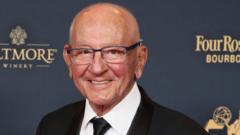The recent sentiment among former WeightWatchers members suggests that traditional dieting approaches are increasingly ineffective, leading many to turn to weight loss medications such as Mounjaro. For individuals like Symone, who battled a relentless cycle of dietary plans from a young age, these injections have provided a sense of control that was previously unattainable through conventional diets. Symone's experience is emblematic of a broader trend where people express dissatisfaction with traditional calorie-counting methods, often feeling as though they are set up to fail by programs like WeightWatchers.
**Diet Industry Faces Decline Amid Rise of Weight Loss Injections**

**Diet Industry Faces Decline Amid Rise of Weight Loss Injections**
The traditional diet industry is struggling to compete as weight loss injections gain popularity, reshaping the landscape of weight management.
The diet industry, once dominated by WeightWatchers and its point-based system, is experiencing significant change, reportedly losing over a million members and filing for bankruptcy amid growing competition from weight loss drugs popularized through social media. Experts are voicing concerns over the long-term implications of turning to pharmaceuticals for weight loss. WeightWatchers continues to assert its scientific credibility and holistic approach to weight management, despite its decline. Meanwhile, new support groups that focus on education rather than sales are emerging, reflecting a shift towards a more comprehensive understanding of health and wellness.
As spotlight shifts towards a holistic view of wellness, traditional weight loss campaigns may struggle unless they adapt to the evolving preferences of consumers, who increasingly seek community support and sustainable practices alongside medical interventions.
Symone, a former WeightWatchers member, reveals that using weight loss injections like Mounjaro has provided her the control over food she long sought, contrasting sharply with her experiences on traditional diet plans. She recalls the relentless mental burden of tracking points and the feeling of failure after multiple diets proved ineffective. At her heaviest, she was diagnosed as pre-diabetic and felt a drastic change was necessary for her health and her children’s future.
This sentiment is replicated across the diet industry, which has seen its subscriber base drastically decline. At its peak, WeightWatchers boasted over 4.5 million members but now struggles against the transformative impact of weight loss drugs fueled by social media influencers. Despite having a legacy of scientific studies supporting its approach, the company has filed for bankruptcy, stating that restructuring will allow continued operation.
Experts urge caution, highlighting that these medications might not offer a permanent solution to obesity as emotional factors driving eating habits remain unaddressed. Holistic approaches emphasizing the psychological aspects of overeating are gaining traction, suggesting that success in weight management may require more than just pharmaceutical aids. New community-driven groups focus on sustainable weight loss methods, resonating with those who prefer support systems over mere calorie restrictions or aggressive medical solutions.
In small community settings, women share their weight loss journeys, offering laughter and comfort while navigating their challenges. Former WeightWatchers leader Lynda Leadbetter expresses concern that her previous employer has shifted focus toward sales rather than genuine support. Some members have embraced weight loss injections, while still attending meetings for encouragement and accountability, marrying both traditional and modern approaches to health and wellness.
With the rise of pharmaceutical-grade weight loss options like Mounjaro, the future of the diet industry remains uncertain, as individuals rethink their relationship with food and wellness in a landscape increasingly dominated by social influences and evidence-based practices.
As spotlight shifts towards a holistic view of wellness, traditional weight loss campaigns may struggle unless they adapt to the evolving preferences of consumers, who increasingly seek community support and sustainable practices alongside medical interventions.
Symone, a former WeightWatchers member, reveals that using weight loss injections like Mounjaro has provided her the control over food she long sought, contrasting sharply with her experiences on traditional diet plans. She recalls the relentless mental burden of tracking points and the feeling of failure after multiple diets proved ineffective. At her heaviest, she was diagnosed as pre-diabetic and felt a drastic change was necessary for her health and her children’s future.
This sentiment is replicated across the diet industry, which has seen its subscriber base drastically decline. At its peak, WeightWatchers boasted over 4.5 million members but now struggles against the transformative impact of weight loss drugs fueled by social media influencers. Despite having a legacy of scientific studies supporting its approach, the company has filed for bankruptcy, stating that restructuring will allow continued operation.
Experts urge caution, highlighting that these medications might not offer a permanent solution to obesity as emotional factors driving eating habits remain unaddressed. Holistic approaches emphasizing the psychological aspects of overeating are gaining traction, suggesting that success in weight management may require more than just pharmaceutical aids. New community-driven groups focus on sustainable weight loss methods, resonating with those who prefer support systems over mere calorie restrictions or aggressive medical solutions.
In small community settings, women share their weight loss journeys, offering laughter and comfort while navigating their challenges. Former WeightWatchers leader Lynda Leadbetter expresses concern that her previous employer has shifted focus toward sales rather than genuine support. Some members have embraced weight loss injections, while still attending meetings for encouragement and accountability, marrying both traditional and modern approaches to health and wellness.
With the rise of pharmaceutical-grade weight loss options like Mounjaro, the future of the diet industry remains uncertain, as individuals rethink their relationship with food and wellness in a landscape increasingly dominated by social influences and evidence-based practices.




















